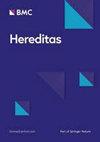基于网络药理学、分子对接和实验验证整合的放线菌治疗结肠癌的机制
IF 2.7
3区 生物学
引用次数: 0
摘要
作为一种抗癌中药,放线菌(Actinidia chinensis Planch,ACP,Tengligen)治疗结肠癌的有效成分和机制尚不清楚。本研究采用网络药理学、分子对接和细胞实验相结合的方法来研究放线菌素对结肠癌的有效机制。利用维恩图和STRING数据库构建了ACP-结肠癌的蛋白-蛋白相互作用网络(PPI),并进一步通过拓扑分析获得了ACP在结肠癌中的关键靶基因。利用基因本体论(GO)和京都基因组百科全书(KEGG)富集分析可视化相关功能和通路。使用 AutoDockTools 等软件确定了关键靶点与化合物之间的分子对接。最后,在体外观察了 ACP 对 CT26 细胞的影响。研究发现了40个ACP-colon关键靶点,包括CASP3、CDK2、GSK3B和PIK3R1。GO和KEGG富集分析发现,这些基因参与了211个生物学过程和92条通路,其中癌症通路中的PI3K-Akt、p53和细胞周期可能是ACP抗结肠癌的主要通路。分子对接验证了ACP的关键成分能与相应的靶点稳定结合。实验结果表明,ACP能抑制CT26细胞的增殖、诱导凋亡并下调PIK3R1、Akt和GSK3B的磷酸化。ACP是一种具有多种成分的抗结肠癌中草药,涉及多个靶基因和信号通路。ACP 能明显抑制结肠癌细胞的增殖并诱导其凋亡,这可能与 PI3K/AKT/GSK3B 信号转导的调控密切相关。本文章由计算机程序翻译,如有差异,请以英文原文为准。
Mechanisms of Actinidia chinensis Planch in treating colon cancer based on the integration of network pharmacology, molecular docking, and experimental verification
As an anticancer Chinese herbal medicine, the effective components and mechanism of Actinidia chinensis Planch (ACP, Tengligen) in the treatment of colon cancer are still unclear. In the present study, the integration of network pharmacology, molecular docking, and cell experiments was employed to study the effective mechanism of ACP against colon cancer. The Venn diagram and STRING database were used to construct the protein–protein interaction network (PPI) of ACP-colon cancer, and further topological analysis was used to obtain the key target genes of ACP in colon cancer. The Gene Ontology (GO) and Kyoto Encyclopedia of Genes and Genomes (KEGG) enrichment analyses were used to visualize the related functions and pathways. Molecular docking between key targets and compounds was determined using software such as AutoDockTools. Finally, the effect of ACP on CT26 cells was observed in vitro. The study identified 40 ACP-colon key targets, including CASP3, CDK2, GSK3B, and PIK3R1. GO and KEGG enrichment analyses found that these genes were involved in 211 biological processes and 92 pathways, among which pathways in cancer, PI3K-Akt, p53, and cell cycle might be the main pathways of ACP against colon cancer. Molecular docking verified that the key components of ACP could stably bind to the corresponding targets. The experimental results showed that ACP could inhibit proliferation, induce apoptosis, and downregulate the phosphorylation of PIK3R1, Akt, and GSK3B in CT26 cells. ACP is an anti-colon cancer herb with multiple components, and involvement of multiple target genes and signaling pathways. ACP can significantly inhibit proliferation and induce apoptosis of colon cancer cells, which may be closely related to the regulation of PI3K/AKT/GSK3B signal transduction.
求助全文
通过发布文献求助,成功后即可免费获取论文全文。
去求助
来源期刊

Hereditas
Biochemistry, Genetics and Molecular Biology-Genetics
CiteScore
3.80
自引率
3.70%
发文量
0
期刊介绍:
For almost a century, Hereditas has published original cutting-edge research and reviews. As the Official journal of the Mendelian Society of Lund, the journal welcomes research from across all areas of genetics and genomics. Topics of interest include human and medical genetics, animal and plant genetics, microbial genetics, agriculture and bioinformatics.
 求助内容:
求助内容: 应助结果提醒方式:
应助结果提醒方式:


